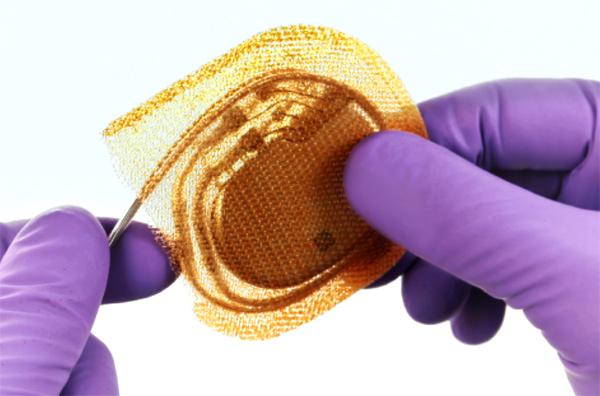
August 15, 2013 — The first implantation of Tyrx Inc.’s new AigisRx R Fully Resorbable Antibacterial Envelope has taken place at the Vanderbilt Heart and Vascular Institute in Nashville, Tenn., by Christopher R. Ellis. The AigisRx R Antibacterial Envelope received U.S Food and Drug Administration (FDA) clearance on May 20, 2013.
“We have been pleased with the performance of the first generation partially resorbable AigisRx,” stated Ellis, cardiac electrophysiologist and assistant professor of medicine at the Vanderbilt Heart and Vascular Institute. “Now with the second generation AigisRx R, we have the added benefit of it being fully bioresorbable, which will shorten procedure times required on potential future interventions.”
The AigisRx R device is a fully bioresorbable, antibacterial mesh envelope, intended to hold cardiac implantable electronic devices (CIEDs), such as pacemakers and implantable cardioverter defibrillators (ICDs) securely in place to provide a stable environment when implanted in the body. The AigisRx R contains the antimicrobial agents rifampin and minocycline, which are released locally into the tissue to help reduce surgical site infections (SSIs) associated with CIED implantation. Multiple studies have shown that patients at high risk for CIED infection who are implanted with the AigisRx Antibacterial Envelope had 70 percent to 100 percent fewer device infections than similar patients who did who did not receive the AigisRx.
Vanderbilt Heart and Vascular Institute recently performed a matched cohort study to compare the incidence of CIED infection in patients receiving a CIED with or without an AigisRx Antibacterial Envelope. After a minimum of 90 days of follow-up, the incidence of CIED infection was significantly lower in the group that received the AigisRx, compared to those that did not (0.4% vs. 3%, OR = 0.13 [0.02-0.95],p=0.04). There were 87 percent fewer CIED infections in patients who received the AigisRx, compared to those who did not. (Kolek et al.Pacing Clin Electrophysiol. 2013;36(3);354-361).
“We are very pleased to have the first U.S. AigisRx R implantation at the Vanderbilt Heart and Vascular Institute,” commented Robert White, Tyrx president and CEO. “The AigisRx R provides physicians and facilities with a key tool in preventing surgical site infections and in helping to lower the hospital costs associated with them. Two recent studies indicate that hospitals can save $102,000 for every 100 high-risk patients that receive the AigisRx Antibacterial Envelope.”
For more information: www.tyrx.com


 January 05, 2026
January 05, 2026 









